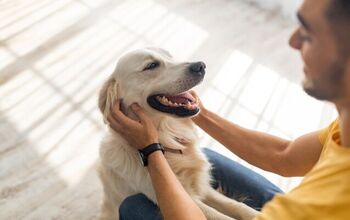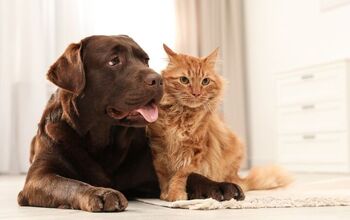Science Proves Humans Are Defenceless Against The Power Of Puppy Dog E

So you always felt you had a special bond with your pooch – a certain indescribable chemistry. Well, you’re right! In fact research shows that the feeling of connectedness you experience when looking down at your little buddy is in fact a chemical reaction akin to what a mom experiences when nursing her newborn child. And believe it or not, he feels it too!
Yes, both dogs and their pet parents get a spike in the chemical oxytocin – also dubbed the “love hormone” – when they make eye contact. Not the fleeting glance as you let him out the back door, but that special, long-drawn gaze that every pet parent understands. In fact, one of the key roles of oxytocin in humans is to help a parent and infant bond.
What’s also interesting is that dogs don’t use this eye contact approach to build bonds with other dogs – it’s reserved just for humans. Which is what has researchers thinking man’s best friend may have secured a special place in your heart by tapping into an ancient human bonding pathway.
A study conducted by the Companion Animal Research Lab at Azabu University in Japan states that as humans, eye contact between one another is much more meaningful. It’s a form of communication that helps us build affiliations and one that we are very sensitive to. The end result is that dogs that can use the eye-gaze technique on owners “efficiently” would have more benefits from humans. Hmmm… are you beginning to feel manipulated too? Don’t, because it goes both ways.
The science involved in this study is fascinating. The team in Japan measured the oxytocin levels of dogs and their owners before and after they spent 30 minutes together. After the “quality time” sessions with lots of gazing, patting and verbal interaction both showed increases in the levels of oxytocin in their urine. And the higher the level for humans, the higher for dogs. In similar experiments with wolves, the researchers found no such increases — even though the wolves were interacting with people who had raised them from pups.
In a second experiment, dogs received a spritz of oxytocin nasal spray. Apparently the gals stared longer at their owners afterward, and both man and dog showed a rise in oxytocin as a result. The findings suggest that the oxytocin feedback loop can cross species boundaries, at least between man and his best friend. So apparently our relationship with dogs is in many ways, similar to our relationships with people.
But dogs aren’t the only ones to have found a way to work the system. Studies suggest our feline companions have consciously evolved their once harsh and aggressive screech to something a little more appealing to owners. Apparently over the past several thousand years they too, learned the best way to get what you wanted was to engage with humans and in this case, by sounding more appealing. Much appreciated at 3 AM when the food dish is empty!
[Source: Mashable]

Sharing space with three seriously judgy Schnoodles and a feline who prefers to be left alone. #LivingMyBestLife
More by Mary Simpson























